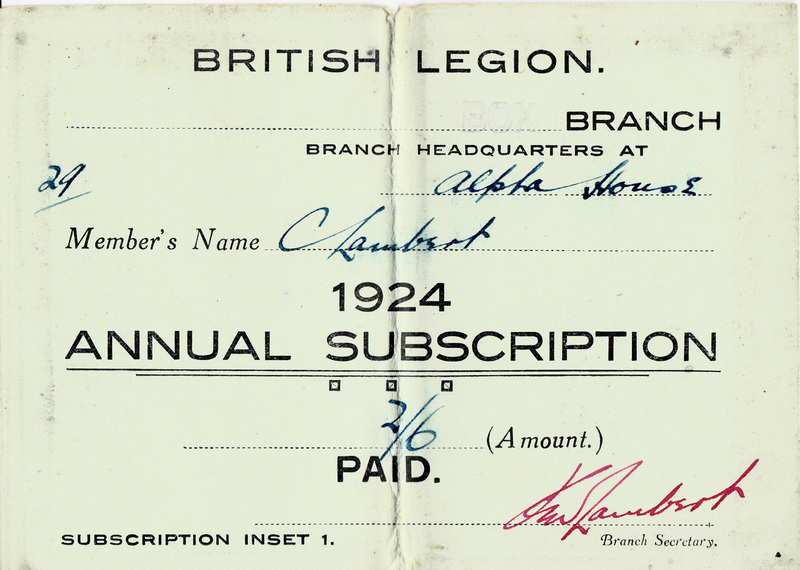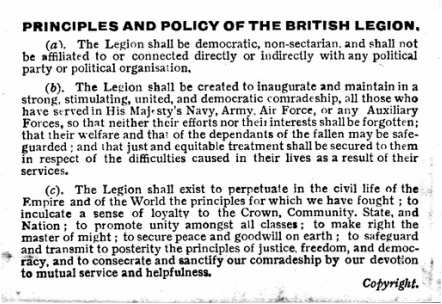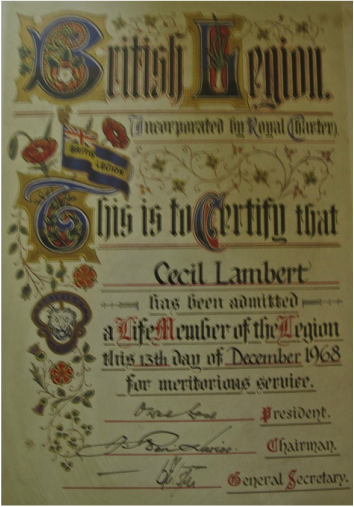Comrades Legion Club (Box, Wilts) Limited Written by Cecil Lambert in September 1966: Provided by Hugh Sawyer
Elsewhere on the website you can read the story of the Hardy family who owned these premises (once called Alpha House, now Hardy House) and ran it as a shop. But this doesn't explain the curious name Comrades Legion Club. Hugh Sawyer (Hardy family descendant) found the answer and kindly sent us Cecil Lambert's notes of the origin of the name and the club on Box High Street.
Origins
The rather provocative name of the club is often a source of wonder and misunderstanding. So the following notes on the club's formation and reason for its name may help to clear the air in the minds of many.
Just after the First World War, scores of ex-service organisations sprang up in the country, one such being the Old Comrades Association (OCA) of which a branch was started in Box during the early part of 1919 with a room in the Old Clock House (now demolished) as its headquarters and with the late Mr William Hunt as its secretary. (Incidentally, it was this same room that was acquired to later become the headquarters of the Home Guard throughout the Second World War !)
Almost immediately, an agitation commenced among the members of the OCA for the need of an ex-service social club and a ways and means committee was formed to go into the possibilities and to seek suitable premises. A number of premises were considered, including the old Malt House in Mill Lane (now Messrs Bests' store), the old Malt House premises in the Market Place (now the Boys' Club), the old stables of the Bear Hotel (now the chemist shop) and the old stables of the Queen's Head Inn (now used as public toilets - recently restored as a private residence).
The rather provocative name of the club is often a source of wonder and misunderstanding. So the following notes on the club's formation and reason for its name may help to clear the air in the minds of many.
Just after the First World War, scores of ex-service organisations sprang up in the country, one such being the Old Comrades Association (OCA) of which a branch was started in Box during the early part of 1919 with a room in the Old Clock House (now demolished) as its headquarters and with the late Mr William Hunt as its secretary. (Incidentally, it was this same room that was acquired to later become the headquarters of the Home Guard throughout the Second World War !)
Almost immediately, an agitation commenced among the members of the OCA for the need of an ex-service social club and a ways and means committee was formed to go into the possibilities and to seek suitable premises. A number of premises were considered, including the old Malt House in Mill Lane (now Messrs Bests' store), the old Malt House premises in the Market Place (now the Boys' Club), the old stables of the Bear Hotel (now the chemist shop) and the old stables of the Queen's Head Inn (now used as public toilets - recently restored as a private residence).
|
Alpha House (now called Hardy House)
Then suddenly, Alpha House came on the market and was considered ideal for the purpose. Negotiations were commenced with the house agent which led to a contract being entered into for the purchase of the premises for the sum of £1,050. The money was raised partly by being registered under the Industrial and Provident Societies Act of 1893 and the subsequent issue of loan-stock to members and others interested, partly by donations, partly by a grant from the United Services Fund, the balance being taken up as a bank loan. The grant from the United Services Fund was based upon so much per head of the ex-service population of the village and is believed to have been £165, which was granted on the condition that the model club rules of the fund were adopted by the management committee. |
Early in 1921 the British Legion was formed as a national movement and granted a Royal Charter for the welfare of all ex-service personnel and this movement gradually swallowed up all the smaller ex-service organisations, so that in July of that same year the local branch of the Old Comrades Association amalgamated with and was registered as a branch of the British Legion. Hence the combined name Comrades Legion which was adopted for the local ex-service club. Following this amalgamation, the Legion branch committee and the ways and means club committee continued to work in close association until the Comrades Legion Club became a reality.
The club was formally opened at 6pm on Saturday December 10th 1921 by the late George Wilbraham Northey Esq assisted by the late Col Marcus Rainsford CB of Ardgay House, Middlehill, who was the club's first president. The signatories (founder members) who signed the application for registration under the previously mentioned 1893 Act, were Messrs Robert Browning, James Browning, Albert Cogswell, Peter Giblin, William Hunt, Cecil Lambert, Lt Col HE Sykes and Lt Col JDB Erskine, DSO, who was the club's first honorary secretary. The first steward appointed was Mr W (Bill) Hemmings who remained in this position as a faithful servant of the club until his death on December 20th 1957.
The club was formally opened at 6pm on Saturday December 10th 1921 by the late George Wilbraham Northey Esq assisted by the late Col Marcus Rainsford CB of Ardgay House, Middlehill, who was the club's first president. The signatories (founder members) who signed the application for registration under the previously mentioned 1893 Act, were Messrs Robert Browning, James Browning, Albert Cogswell, Peter Giblin, William Hunt, Cecil Lambert, Lt Col HE Sykes and Lt Col JDB Erskine, DSO, who was the club's first honorary secretary. The first steward appointed was Mr W (Bill) Hemmings who remained in this position as a faithful servant of the club until his death on December 20th 1957.
|
Objectives
The declared objects of the club were for the club proprietors to provide for the use of members the means of social intercourse, mutual helpfulness, mental and moral improvement, rational recreation and the other advantages of a club; also further to advance that comradeship which sprang up whilst serving their country. The rules provided for three classes of members: a. All ordinary members and life members of the British Legion b. All ex-servicemen other than a. members c. Honorary members (non service) of the British Legion over 20 years of age. |
Class a. members had certain advantages over the two other classes, such as cheaper membership fees and full eligibility to serve on the management committee. Also class c. members were limited to a percentage of the total membership. (As the years elapsed, however, the rules were amended until the time was reached when ex-service members no longer enjoyed special privileges and all members had the same standing.)
One of the first decisions made by the club committee was to become affiliated to the British Legion at an annual fee, which entitled members to the free use of all British Legion clubs. The committee also granted free use of the club premises to the local branch of the Legion as its headquarters, which privilege was still being enjoyed in 1966.
Takeover Bid
This affiliation lasted for some years until the British Legion headquarters became rather officious and demanded that the club premises should be made over to them, although they had nothing to do with the formation of the club, either financially or otherwise. It is perhaps not surprising, under these circumstances, that the club committee flatly turned down the demand and forthwith ended affiliation. Following this episode, the Legion demanded that the word Legion be deleted from the club title but this was also resisted and through the good offices of the then honorary solicitor of the club, the late Mr J Vezey, the Legion's demand was eventually withdrawn.
One of the first decisions made by the club committee was to become affiliated to the British Legion at an annual fee, which entitled members to the free use of all British Legion clubs. The committee also granted free use of the club premises to the local branch of the Legion as its headquarters, which privilege was still being enjoyed in 1966.
Takeover Bid
This affiliation lasted for some years until the British Legion headquarters became rather officious and demanded that the club premises should be made over to them, although they had nothing to do with the formation of the club, either financially or otherwise. It is perhaps not surprising, under these circumstances, that the club committee flatly turned down the demand and forthwith ended affiliation. Following this episode, the Legion demanded that the word Legion be deleted from the club title but this was also resisted and through the good offices of the then honorary solicitor of the club, the late Mr J Vezey, the Legion's demand was eventually withdrawn.
|
So that now (1966), 45 years after its inauguration the Comrades Legion Club (Box, Wilts) Limited is still carrying on under the same name and was in fact registered with the same title on 19th March 1965, when a new set of rules were also adopted.
Conclusion These notes were made by the only surviving founder member of the club, who took an active part in its formation and who has been a continuous member of its management in various capacities up to the present time. These notes may seem to be rather disparaging of the British Legion but are not intended to be so, as there are always two sides to a question. The good work of the Legion on behalf of ex-service personnel is well-known, also the fact that the writer has been one of its members ever since its inception, is the present chairman of the branch and has received the Legion's highest award, should be sufficient proof that these notes are intended to be factual only and certainly not in any way derogatory. Left: Certificate for meritorious service given to Cecil in 1968 (courtesy Anna Grayson). |
It is fascinating to find the origin of the Club's unusual name and, even better, we have the story of the club from one of the original founders, Cecil Lambert, who has been a stalwart of village activities in the early part of the twentieth century.



